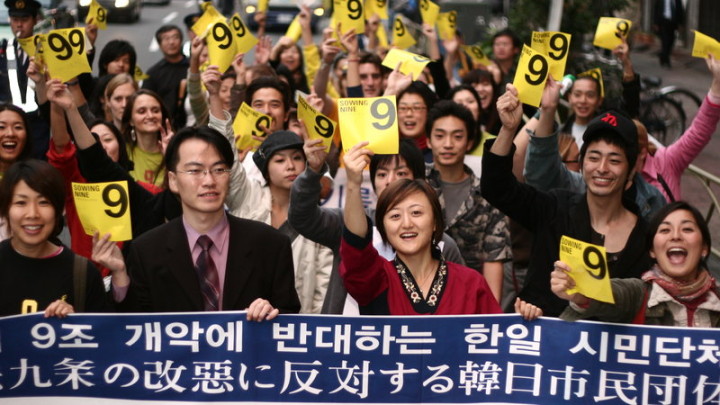Prime Minister Shinzo Abe: Save Japan’s Peace Constitution
[Read this in French. Also find a previous version in Japanese, Korean,Chinese, Spanish, and Russian.]
Today, Japan’s peace constitution is – more than ever – in danger.
Japan’s Diet is currently deliberating a controversial set of security bills that would, if adopted, result in a drastic shift away from the country’s exclusively defense-oriented security policy and significantly depart from what has been authorized to date under war-renouncing Article 9 of the Japanese constitution.
The legislation seeks to codify Prime Minister Abe Shinzo’s contentiousJuly 2014 Cabinet decision that reinterpreted the Constitution to allow Japan to exercise the right to collective self-defense and expand Japan’s security role around the world, under Abe’s pet-doctrine of “pro-active pacifism”.
Its adoption is also necessary to put the newly revised guidelines on Japan-U.S. defense cooperation into effect. Formally revised for the first time in 18 years in late April 2015, the new guidelines eliminate restrictions on deployment and the use of military forces, and envision expansion of the scope of SDF operations far beyond what previous governments have allowed in the rhetoric on self-defense for decades. Washington, which has long prodded Tokyo for an increased Japanese participation in the US “Pivot to Asia”, is supportive of the move, while Japan’s neighbors, notably China and South Korea, are utterly concerned that it may further destabilize the fragile peace in the region.
Abe’s legislative move is the latest of a long series of initiatives that overstep Article 9 and some of the country’s longstanding peace policies. These measures include re-interpreting Article 9; formulating a new national security policy; establishing a National Security Council; revamping defense guidelines; announcing yet a further increase of the country’s military budget for 2015; and drastically relaxing the long-held arms export ban.
Abe’s controversial security legislation is facing broad opposition in the Diet and among the public that question the set of bills, in principle, on substance, and in the way it is being pushed forward.
On June 4, 2015, three of the most respected Japanese constitution lawyers questioned the legitimacy of the July 2014 Cabinet decision and declared the security bills “unconstitutional” – a view shared by an enormous majority of the country’s scholars.
A large part of the public oppose Abe’s bid to enact the new security legislation, and numerous protests and demonstrations denouncing the administration’s pro-war policies and path to militarization have taken place all over the country, with tens of thousands of people taking the streets.
The Abe government must take into account the widely shared criticism that the legislation violates Japan’s pacifist constitution, and listen to the growing popular mobilization in support of Article 9.
Article 9 of the Japanese Constitution:
“ARTICLE 9. Aspiring sincerely to an international peace based on justice and order, the Japanese people forever renounce war as a sovereign right of the nation and the threat or use of force as means of settling international disputes. (2) To accomplish the aim of the preceding paragraph, land, sea, and air forces, as well as other war potential, will never be maintained. The right of belligerency of the state will not be recognized.”
Japan’s Peace Pledge
Japan adopted its war-renouncing constitution following World War II. Article 9 is a pledge to Japan itself and to the world, particularly neighboring countries that suffered under Japanese invasions and colonial rule, to never repeat its mistakes.
Despite constitutional restrictions, Japan has developed and gradually expanded its Self-Defense Forces (SDF) to become one of the world’s top military spenders and one of the most advanced militaries in Asia. Yet, to date, the existence of Article 9 – and the Japanese people’s support for its principles – have forced the government to maintain peace policies, including non-export of arms, a non-nuclear policy, and not deploying the SDF for active combat.
Global Impact of Article 9
Article 9 is not just a provision of the Japanese law. It also acts as an international peace mechanism towards reducing military spending, supporting conflict prevention, promoting nuclear-weapon-free zones, recognizing the human right to peace, and more.
Risks for Regional/International Peace and Stability
At the regional level, Article 9 has served as “the foundation for collective security for the entire Asia Pacific region.”
In today’s context of exacerbated regional tensions involving Japan, China, and the Koreas, changing Article 9 – coupled with a series of controversial remarks on historical and reconciliation issues – threaten to destabilize the fragile peace in Northeast Asia, triggering an arms race and escalating into a regional – if not global – conflict.
Global Article 9 Campaign
Launched in 2005 by a coalition of civil society organizations in Japan, the Global Article 9 Campaign seeks not only to locally protect Article 9; it also acts to educate people around the world about existing international peace mechanisms such as Japan’s Constitution and encourage governments to work towards disarmament, demilitarization and a culture of peace.
Call for support
Japanese civil society is mobilizing and seeking your urgent support – for Japan’s peace constitution and against the Japanese government’s trend of nationalism, historical revisionism and its path to militarism that would have grave consequences for Japan, the regional context and international peace.
More information on the Global Article 9 Campaign: www.article-9.org – Contact celine@peaceboat.gr.jp







